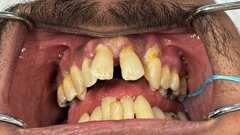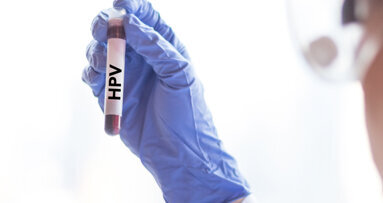WINSTON-SALEM, N.C., U.S.: Within the health sector, dentistry has been leading the way when it comes to personalizing treatment. In a recent study that has turned its focus to cancer treatment, researchers have identified certain characteristics in patients with head and neck cancer linked to the human papillomavirus (HPV) that may help personalize levels of radiation and chemotherapy.
“Head and neck cancers that are caused by HPV infection tend to have a better overall outcome than head and neck cancers related to other factors like smoking and alcohol,” said Dr. Gaorav Gupta, assistant professor in the Department of Radiation Oncology at the University of North Carolina School of Medicine, Chapel Hill. “There’s been a lot of interest in exploring whether we can give less treatment to these patients and still achieve the same level of cure, while reducing the toxicities of treatment.”
Using blood test results from a previous study of 103 patients who were undergoing chemotherapy and radiation for HPV-linked oropharyngeal squamous cell carcinoma, the team was able to identify specific traits that could help to stratify and personalize treatment. According to the study, there were a number of surprising factors to emerge from the results. A biomarker of a good outcome was a high level of circulating tumor HPV DNA in the blood before treatment. Conversely, they found that patients with low levels of circulating DNA from tumors at the outset—or less than 200 copies of HPV DNA per milliliter—and with unfavorable clearance of HPV DNA after treatment had a higher risk of recurrence.
Since the results seem counterintuitive, the team plans to undertake further investigation. “It may seem confusing at first, but we think it reflects how addicted the tumor is to HPV biology,” noted Gupta.
What also surprised the researchers was the finding that patients who then rapidly cleared the circulating tumor DNA from their blood were more likely to have improved outcomes. Patients who were able to clear 95% of the DNA from their blood in the first 28 days of treatment were considered to have a favorable clearance rate.
Speaking about the future possibilities of the study, lead author Dr. Bhishamjit S. Chera, Associate Chair of Clinical Operations and Improvement in the Department of Radiation Oncology, said: “What this means is that in the future, dynamic, real-time monitoring of circulating tumor HPV DNA in the blood during treatment may help us better personalize and select treatment—especially the level of radiation and chemotherapy we give the patient.”
The study, titled “Rapid clearance profile of plasma circulating tumor HPV Type 16 DNA during chemoradiotherapy correlates with disease control in HPV-associated oropharyngeal cancer,” was published on Aug. 1, 2019, in Clinical Cancer Research.
Tags:
BRUSSELS, Belgium/RUGBY, UK: At the recent 2019 European Cancer Summit of the European CanCer Organisation (ECCO), the ECCO Oncopolicy Committee agreed on a...
BALTIMORE, U.S.: A study by researchers at the Sidney Kimmel Comprehensive Cancer Center at Johns Hopkins University in Baltimore has found that a wide ...
AUGUSTA, Ga., U.S.: For a group of researchers from the Medical College of Georgia at Augusta University, the enzyme ecto-5’-nucleotidase (CD73) is going ...
PORTLAND, Ore., USA: Researchers at the Oregon Health and Science University (OHSU) have developed a revolutionary process by which to engineer new blood ...
ABERDEEN, Scotland: Head and neck cancer is a highly debilitating disease that has profound consequences for oral function, nutrition, communication and ...
PUNE, India: According to the World Cancer Research Fund International, cancer of the oral cavity is one of the most common types of cancer worldwide, with ...
ANN ARBOR, Mich., U.S.: As dental implants become an increasingly common treatment modality for edentulous patients, understanding their potential side ...
BIRMINGHAM, Ala, U.S.: Known to cause several cancers, human papillomaviruses (HPV) are contracted by around 12,000 people—aged between 15 and 24—each ...
BOSTON, U.S.: Root canal therapy and the materials and techniques used to perform them are continually evolving. However, the fact remains that after the ...
CHICAGO, USA: A study conducted in the U.S. has found that the human papillomavirus (HPV) vaccine may help reduce oral infections that cause mouth and ...
Live webinar
Mon. 23 February 2026
3:00 am EST (New York)
Ass. Prof. Elizabeth Shick, Dr. Zehra Yonel
Live webinar
Tue. 24 February 2026
1:00 pm EST (New York)
Prof. Dr. Markus B. Hürzeler
Live webinar
Tue. 24 February 2026
3:00 pm EST (New York)
Prof. Dr. Marcel A. Wainwright DDS, PhD
Live webinar
Wed. 25 February 2026
11:00 am EST (New York)
Prof. Dr. Daniel Edelhoff
Live webinar
Wed. 25 February 2026
1:00 pm EST (New York)
Live webinar
Wed. 25 February 2026
8:00 pm EST (New York)
Live webinar
Tue. 3 March 2026
11:00 am EST (New York)
Dr. Omar Lugo Cirujano Maxilofacial



 Austria / Österreich
Austria / Österreich
 Bosnia and Herzegovina / Босна и Херцеговина
Bosnia and Herzegovina / Босна и Херцеговина
 Bulgaria / България
Bulgaria / България
 Croatia / Hrvatska
Croatia / Hrvatska
 Czech Republic & Slovakia / Česká republika & Slovensko
Czech Republic & Slovakia / Česká republika & Slovensko
 France / France
France / France
 Germany / Deutschland
Germany / Deutschland
 Greece / ΕΛΛΑΔΑ
Greece / ΕΛΛΑΔΑ
 Hungary / Hungary
Hungary / Hungary
 Italy / Italia
Italy / Italia
 Netherlands / Nederland
Netherlands / Nederland
 Nordic / Nordic
Nordic / Nordic
 Poland / Polska
Poland / Polska
 Portugal / Portugal
Portugal / Portugal
 Romania & Moldova / România & Moldova
Romania & Moldova / România & Moldova
 Slovenia / Slovenija
Slovenia / Slovenija
 Serbia & Montenegro / Србија и Црна Гора
Serbia & Montenegro / Србија и Црна Гора
 Spain / España
Spain / España
 Switzerland / Schweiz
Switzerland / Schweiz
 Turkey / Türkiye
Turkey / Türkiye
 UK & Ireland / UK & Ireland
UK & Ireland / UK & Ireland
 Brazil / Brasil
Brazil / Brasil
 Canada / Canada
Canada / Canada
 Latin America / Latinoamérica
Latin America / Latinoamérica
 USA / USA
USA / USA
 China / 中国
China / 中国
 India / भारत गणराज्य
India / भारत गणराज्य
 Pakistan / Pākistān
Pakistan / Pākistān
 Vietnam / Việt Nam
Vietnam / Việt Nam
 ASEAN / ASEAN
ASEAN / ASEAN
 Israel / מְדִינַת יִשְׂרָאֵל
Israel / מְדִינַת יִשְׂרָאֵל
 Algeria, Morocco & Tunisia / الجزائر والمغرب وتونس
Algeria, Morocco & Tunisia / الجزائر والمغرب وتونس
 Middle East / Middle East
Middle East / Middle East













































To post a reply please login or register